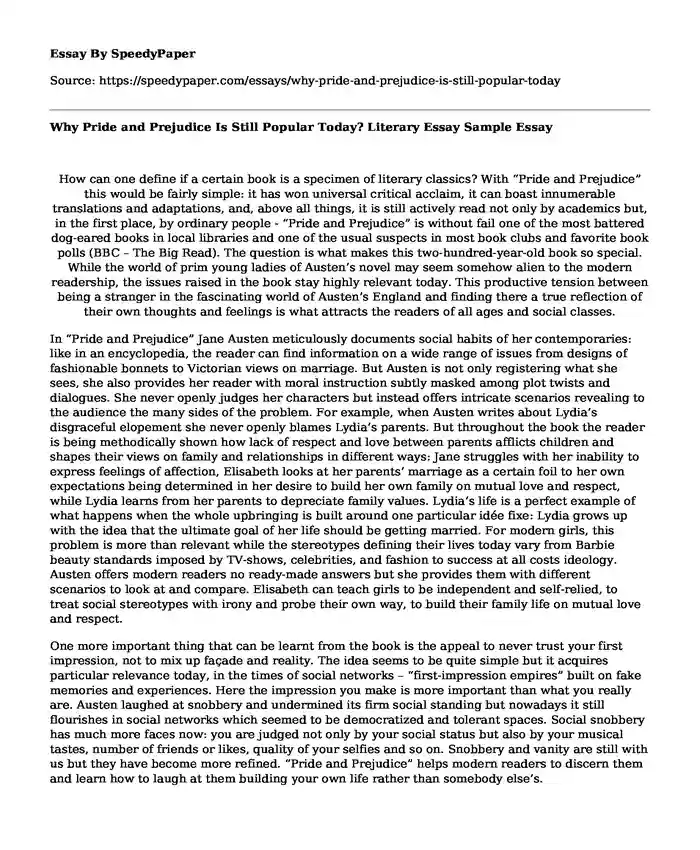
| Type of paper: | Essay |
| Categories: | Female English literature Jane Austen Pride and Prejudice Romantic literature |
| Pages: | 3 |
| Wordcount: | 707 words |
How can one define if a certain book is a specimen of literary classics? With “Pride and Prejudice” this would be fairly simple: it has won universal critical acclaim, it can boast innumerable translations and adaptations, and, above all things, it is still actively read not only by academics but, in the first place, by ordinary people - “Pride and Prejudice” is without fail one of the most battered dog-eared books in local libraries and one of the usual suspects in most book clubs and favorite book polls (BBC – The Big Read). The question is what makes this two-hundred-year-old book so special. While the world of prim young ladies of Austen’s novel may seem somehow alien to the modern readership, the issues raised in the book stay highly relevant today. This productive tension between being a stranger in the fascinating world of Austen’s England and finding there a true reflection of their own thoughts and feelings is what attracts the readers of all ages and social classes.
In “Pride and Prejudice” Jane Austen meticulously documents social habits of her contemporaries: like in an encyclopedia, the reader can find information on a wide range of issues from designs of fashionable bonnets to Victorian views on marriage. But Austen is not only registering what she sees, she also provides her reader with moral instruction subtly masked among plot twists and dialogues. She never openly judges her characters but instead offers intricate scenarios revealing to the audience the many sides of the problem. For example, when Austen writes about Lydia’s disgraceful elopement she never openly blames Lydia’s parents. But throughout the book the reader is being methodically shown how lack of respect and love between parents afflicts children and shapes their views on family and relationships in different ways: Jane struggles with her inability to express feelings of affection, Elisabeth looks at her parents’ marriage as a certain foil to her own expectations being determined in her desire to build her own family on mutual love and respect, while Lydia learns from her parents to depreciate family values. Lydia’s life is a perfect example of what happens when the whole upbringing is built around one particular idée fixe: Lydia grows up with the idea that the ultimate goal of her life should be getting married. For modern girls, this problem is more than relevant while the stereotypes defining their lives today vary from Barbie beauty standards imposed by TV-shows, celebrities, and fashion to success at all costs ideology. Austen offers modern readers no ready-made answers but she provides them with different scenarios to look at and compare. Elisabeth can teach girls to be independent and self-relied, to treat social stereotypes with irony and probe their own way, to build their family life on mutual love and respect.
One more important thing that can be learnt from the book is the appeal to never trust your first impression, not to mix up façade and reality. The idea seems to be quite simple but it acquires particular relevance today, in the times of social networks – “first-impression empires” built on fake memories and experiences. Here the impression you make is more important than what you really are. Austen laughed at snobbery and undermined its firm social standing but nowadays it still flourishes in social networks which seemed to be democratized and tolerant spaces. Social snobbery has much more faces now: you are judged not only by your social status but also by your musical tastes, number of friends or likes, quality of your selfies and so on. Snobbery and vanity are still with us but they have become more refined. “Pride and Prejudice” helps modern readers to discern them and learn how to laugh at them building your own life rather than somebody else’s.
“Pride and Prejudice” is a book which speaks about universal problems in a way that is never moralizing but funny, ironic and enlightening instead and this cannot but appeal to modern readers.
Works Cited
"BBC – The Big Read – Top 100 Books." BBC. BBC, May 2003. Web. 11 July 2016.
Cite this page
Why Pride and Prejudice Is Still Popular Today? Literary Essay Sample. (2017, Sep 20). Retrieved from https://speedypaper.com/essays/why-pride-and-prejudice-is-still-popular-today
Request Removal
If you are the original author of this essay and no longer wish to have it published on the SpeedyPaper website, please click below to request its removal:
- Society's Reaction to Delinquent Behaviors, Free Essay on Juvenile Delinquency
- College Students Should Not Be Paid - Argumentative Essay Example
- Free Essay Example on the Issue of Sexual Assault in the Military
- How to Minister to Prostitutes, Religion Essay Sample
- Essay Sample: Law of Multiple Proportions
- Essay Sample on Love Stories
- Free Essay: A Speech on Solace and the Solidarity for the Inuit Community
Popular categories




